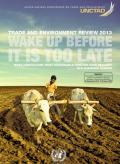Climate-related disasters have inflicted increasingly high losses on developing countries, and with climate change, these losses are likely to worsen. Improving country resilience against climate risks is therefore vital for achieving poverty reduction and economic development goals.
This report discusses the current state of knowledge on how to build climate resilience in developing countries. It argues that climate-resilient development requires moving beyond the climate-proofing of existing development pathways, to consider economic development objectives and resilience priorities in parallel. Achieving this will require political vision and a clear understanding of the relation between climate and development, as well as an adapted institutional set-up, financing arrangements, and progress monitoring and evaluation. The report also discusses two priorities for climate-resilient development: disaster risk management and the involvement of the private sector.
In order to achieve long-term sustainable growth, countries in Sub-Saharan Africa need to adapt their economies and growth models taking 'Green Growth' or 'Green Economy' concepts into account. Only in a scenario, where economic growth and the conservation and sustainable management of natural resources are equally taken into consideration, poverty can be reduced in a sustainable way. On behalf of the German Federal Ministry of Economic Cooperation and Development (BMZ), GIZ supports partner countries in the transition towards a Green Economy, helping them to use upcoming opportunities, manage political risks throughout the transformation process, and tap into new markets and products based on a green economy.
This monograph presents a critical review of carbon trading in Africa. It comprises a compendium of essays by an expert group of authors, each analysing key issues from a corruption and governance perspective. The chapters include a discussion on the context of and trends in the carbon market in Africa, offset projects in Uganda, Ethiopia and South Africa, carbon finance and regulation. The authors explore issues around transparency and accountability, and examine the integrity of systems and processes aimed at achieving professed goals of climate change mitigation and sustainable development. While deficits in transparency and accountability do not necessarily constitute corruption, they are nevertheless seen as cause for concern as they provide opportunities for corrupt activities to take place. In general, corruption is approached in a nuanced way because carbon trading provides new and different ways of profiting illegitimately at the expense of a deteriorating climate. For this reason, the study adopts a broad definition of corruption, sometimes using it to indicate a particular or singular abuse, and sometimes to refer to systemic challenges.

As the global population heads toward 9 billion by 2050, decisions made today will lock countries into growth patterns that may or may not be sustainable in the future. Care must be taken to ensure that cities and roads, factories and farms are designed, managed, and regulated as efficiently as possible to wisely use natural resources while supporting the robust growth developing countries still need. Economic development during the next two decades cannot mirror the previous two: poverty reduction remains urgent but growth and equity can be pursued without relying on policies and practices that foul the air, water, and land.
